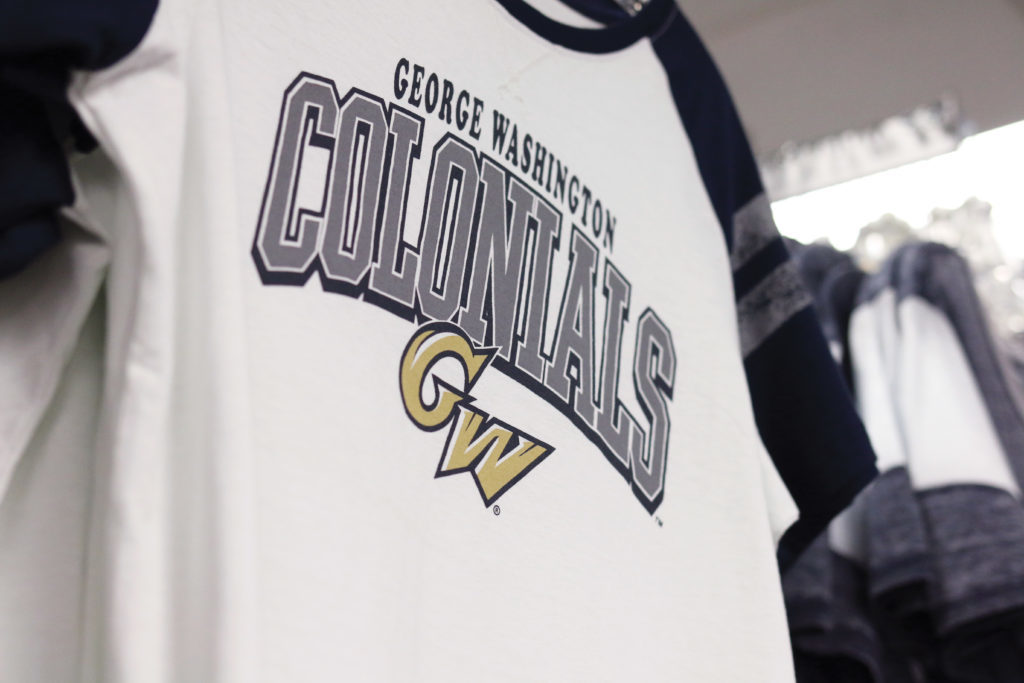Updated: June 23, 2022 at 1:26 a.m.
The Board of Trustees voted to retire the Colonials moniker and expects to pick a replacement by the 2023-24 academic year, following years of pressure from student activists that prompted an extensive, two-year-long review, according to a University release.
Officials said they will decide on a new moniker for the 2023-24 academic year based on the recommendation of the Special Committee on the Colonials moniker. The Colonials moniker will stay in place until the 2023-24 academic year after a “broad University engagement process,” the release states.
“The Board recognizes the significance of changing the University’s moniker, and we made this decision only after a thoughtful and deliberate process that followed the renaming framework and special committee recommendation that considered the varying perspectives of our students, faculty, staff, alumni and athletics community,” Board Chair Grace Speights said in the release. “A moniker must unify our community, draw people together and serve as a source of pride. We look forward to the next steps in an inclusive process to identify a moniker that fulfills this aspiration.”
Officials will replace the nearly century-old Colonials moniker more than two years after administrators formed a special committee to consider the name change in response to students who said the moniker glorified the legacy of international colonialism, slavery and racial discrimination.
“I was impressed by the principled and collaborative approach of the special committee, and it was clear this process was driven by research and robust engagement with the community,” interim University President Mark Wrighton said in the release. “While some may disagree with the outcome, this process has determined that changing the moniker is the right decision for our University.”
The Colonials moniker had slowly lost visibility on campus in the years leading up to the Board’s decision. Within a few months of each other in late 2019, student leaders changed the name of GW’s fan section at sporting events from Colonial Army to George’s Army, the Colonial Central became the Student Services Hub and administrations renamed an event once called Coffee with Colonials to Coffee with Alumni.
Calls to change GW’s official moniker started to mount in 2018 when students launched a petition – which garnered nearly 550 signatures – demanding that officials change the nickname that they called “extremely offensive” and suggesting alternatives like the “Hippos,” “Revolutionaries” or “Riverhorses.”
The Student Association held a referendum in spring 2019, where about 54 percent of students who voted favored changing the moniker. A panel of professors and students criticized the nickname for potentially hurting students who have suffered the long-lasting effects of international colonialism earlier that month.
Former SA President SJ Matthews issued an executive order in September 2019 to establish a student-run task force to research replacing the moniker, but the body didn’t have authority to change the University’s marketing. Students and alumni criticized the Colonials moniker during the Diversity Summit later that fall at an event hosted by the Anything But Colonial Coalition, saying the nickname reinforced a “divisive hierarchy” and made the University “complicit” in centuries of colonial violence and repression.
“’The Colonial’ has been how we’ve identified as a campus for almost a century now,” Hayley Margolis, one of the leaders of the coalition, said at the time. “We’ve learned to celebrate it, we’ve learned to embrace it, so part of this conversation is going to be unlearning that.”
The Board of Trustees established procedures to evaluate the moniker renaming in June 2020, and nearly a month later, former University President Thomas LeBlanc created two University-wide committees to examine the Colonials moniker and the Cloyd Heck Marvin Center, which officials renamed last June. The Special Committee on the Colonials Moniker has discussed six considerations to determine whether officials should change the name, like the history of the moniker and the “depth and breadth” of harm caused by the use of the term.
The Colonials moniker special committee consisted of three faculty members, two staff members, four student and alumni representatives and three additional advisers. Mary Cheh, a D.C. Council member and a research professor of law, chaired the committee.
The committee reviewed more than a dozen historical documents outlining the Colonials moniker’s use on campus and how officials originally decided on the moniker.
The University used the word “Colonial” to represent GW and its athletic teams as early as 1926, according to the documents. They reveal that early pushes to use the name as the University’s moniker came from editorials in The Hatchet and public confusion over GW’s athletic marketing that previously used team names including the “Buff and Blue,” the “Crummen” and the “Hatchetites.”
Former University President Thomas LeBlanc said in January 2021 that he expected the Special Committee on the Colonials Moniker to decide whether to keep the moniker before the Board met later that May. But the GW community didn’t receive any further updates about the potential name change until last October when Speights told The Hatchet that trustees received the task force’s recommendations on the moniker change.
The Board’s renaming task force, which officials formed in November 2019, was also charged with addressing a string of separate requests to rename various buildings and areas on campus like Monroe Hall and the William P. Barr Dean’s Suite at GW Law.
“It is the sense of the Board of Trustees that reconsideration of the name of a building or memorial of any sort should be a rare undertaking, pursued only in extraordinary circumstances,” GW’s renaming framework states.
LeBlanc said officials wouldn’t start to consider any of the six additional naming requests until reaching decisions on renaming the Marvin Center and Colonials moniker.
“We’re not likely to be commenting along the way,” LeBlanc said in an interview last January. “This is a process that really culminates in a decision by the Board, and there’s not a lot to say in the middle of the process, but we obviously will keep the community posted on the progress of those committees.”
The Hippo has served as an unofficial mascot at GW since 1996, when former University President Stephen Joel Trachtenberg donated a statue of a hippo to the graduating class of 2000, before officials installed it outside of the Lisner Auditorium.
Officials considered phasing out the unofficial hippo mascot from University marketing and merchandise in 2008 because of difficulties with registering the Hippo logo as a trademark. In 2020, Matthews kicked off a campaign to “save” the hippo as a symbol of GW after officials decided to remove the “River Horse” statue from campus tours for prospective students.
“We are trying to get better brand recognition in the national collegiate market as GW,” John Och, the University’s then-coordinator for licensing and trademarks, said. “The hippo is not a registered mascot, and it’s better for us to put forward one unified brand.”
Ianne Salvosa contributed reporting.






